Catsare one of the most popular pets for many people. In fact, about 370 million catsare keptas pets globally. Responsible pet owners know that every pet needs a forever home. A place where they can live out their best days without having to worry about moving or new owners.
This woman got a surprise when a friend who asked her toadopt her catsuddenly demanded that she give it back. When the woman refused, she was called a “cat thief” and was threatened with legal action. So, sheaskedpeople online whether her stance was really so unreasonable.
To know more about the specifics of rehoming cats,Bored Pandareached out to Amy Shojai, CABC, a certified animal behaviorist. She explained how cats form strong bonds with their territory and how they handle frequent owner changes. Read her expert insights below!
More info:Amy Shojai|Amy Shojai books
RELATED:
A woman agreed to take in her friend’s cat, but was asked to return it some months later

Image credits:AnnaStills (not the actual photo)
When she refused, the ex-owner branded her a “cat thief”


Image credits:Dương Nhân (not the actual photo)

Image credits:
Moving can be very stressful for cats
Humans might feel attached to their homes for sentimental reasons.Cats, on the other hand, find it hard to adapt to a new home for different reasons. According to pet expert Amy Shojai, cats bond very strongly with their surroundings. When they’re away from their home territory, they typically feel stressed.
Shojai says that the effect rehoming can have on a cat depends on the circumstances. She invites owners to consider things like how long the cat lived with their previous people and whether it was a good, bad, or indifferent experience. Whether the cat was used to living with other cats, pets, and children matters, too. If they will be introduced to them for the first time, that might be stressful.
“Most cats bond very strongly with their home/territory,” Shojai explains. “Any change in routine (especially a move to unfamiliar surroundings) increases stress. It can take cats many days, more often weeks, and, sometimes, months to feel comfortable in a new home.”
“Once they adjust, cats become more accepting of close contact and interaction. They may go from hiding under the bed or avoiding people/other pets to spending more time with new owners and soliciting pets,” the pet expert points out.

Image credits:Paul Hanaoka (not the actual photo)
Cats form attachments to their owners, but in a different way than people might expect
The new owner of Mina in this story worries that the sudden change of owners will throw the cat out of balance. She feels like the cat got used to the household and considers herself Mina’s new owner. Pet expert Amy Shojai claims that cats do indeed grow attached to their owners, but in a slightly different manner than people think.
“Cats are social creatures,” she explains. “They like routine. And many cats want to control interaction. Like many creatures, cats form attachments with other people and pets when they feel safe in their presence and derive a perceived benefit from the interaction. Benefits include food, play, acceptable interaction (like an interactive game or snuggling).”
However, every cat is different, and many other variables can determine their behavior. Most cats who have been living in a shelter or rescued won’t behave in a “normal” way, for example. “Think of it as a form of PTSD – uprooted without explanation from [a] familiar home and dumped in a scary place with strangers who might be dangerous ([in] the cat’s way of thinking),” Shojai explains.
“So, above all, have patience when rehoming cats,” she urges all cat owners. “Building positive relationships rarely [means] ‘love at first sight,’ but with care, love can grow.” For those who’d like to learn more, Amy Shojai has manycat care booksavailable. You can find more detailed information about cat behavior and how to overcome challenges with your favorite feline there!

Image credits:Kate Stone Matheson (not the actual photo)
It’s possible to sue someone for stealing your cat, just like with any other type of property
To some people, it might seem silly to threaten legal action over a cat. “It’s just a pet!” many might say. But precisely because it’sa pet– a pet that they loved, doted on, and spent copious amounts of time with – an owner might be ready to do everything to get it back.
It’s hard to say whether such legal action would be successful. The North Shore Animal Leagueclaimsthat it’s possible to sue someone over wrongfully withholding an animal. The principle is the same as with any other personal property: people can usereplevin actionto get their possessions back. Calling the police is another option; however, they might not want to meddle in disputes between “friends.”
The best way to prevent cases like in this story is to have the rehoming agreement in writing. Then there’s written proof of who is giving temporary ownership of the cat to whom and who is the true owner. Documents like veterinary records, microchips and other registrations,pet adoptionrecords, and sales agreements can help to prove ownership to a court or police.

Image credits:Ludemeula Fernandes (not the actual photo)
“The cat is yours,” many netizens pointed out, “Enjoy the kitty”
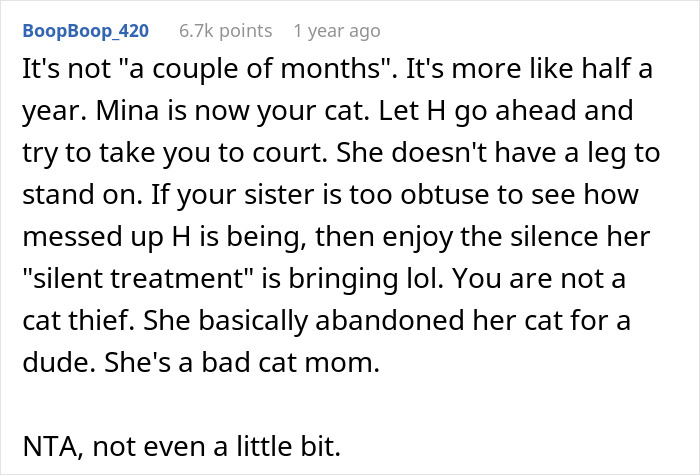


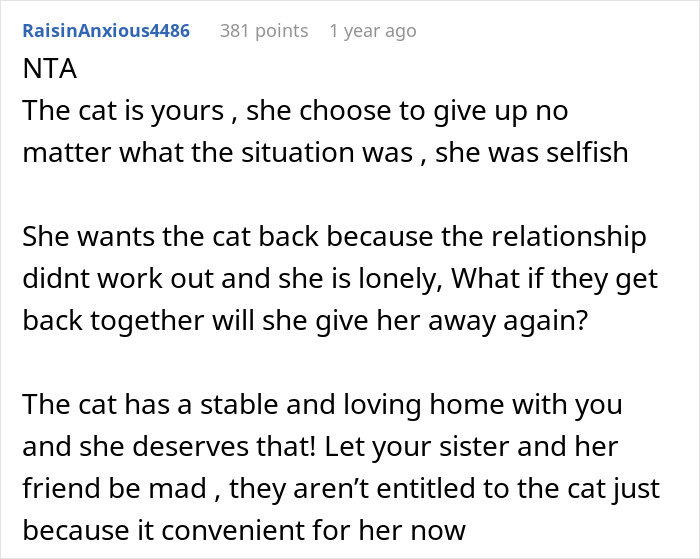













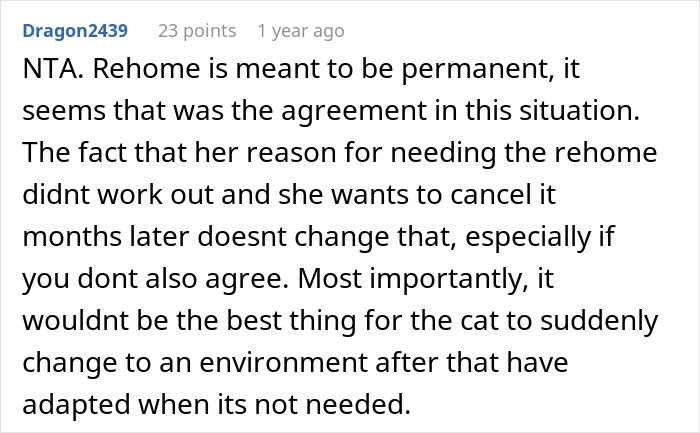





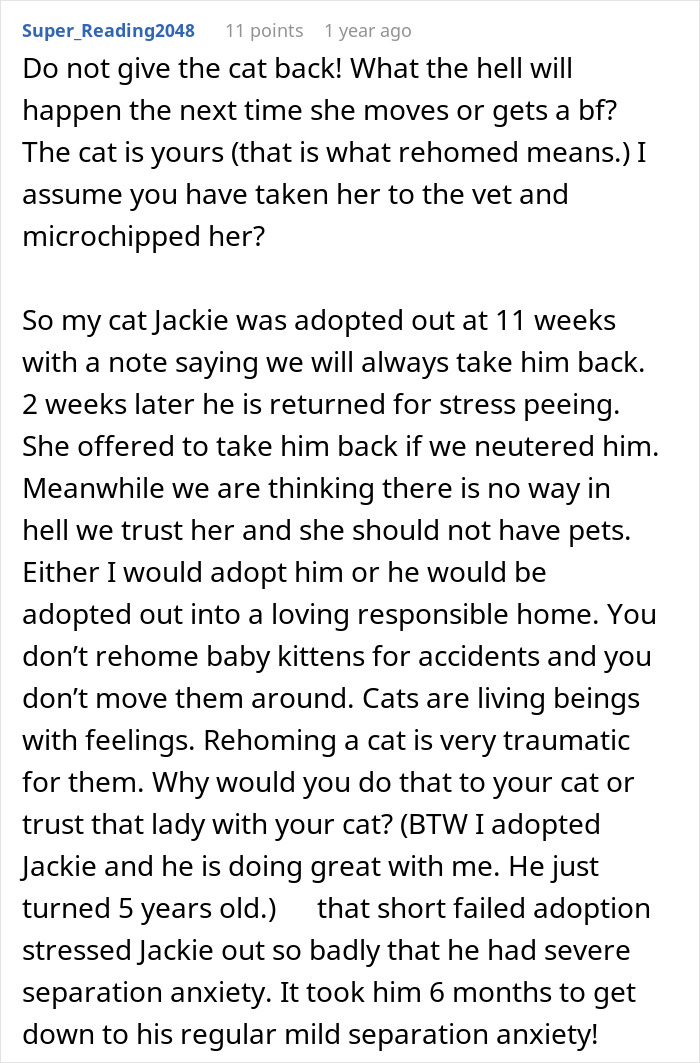


Although some believed that the cat is more attached to her original owner




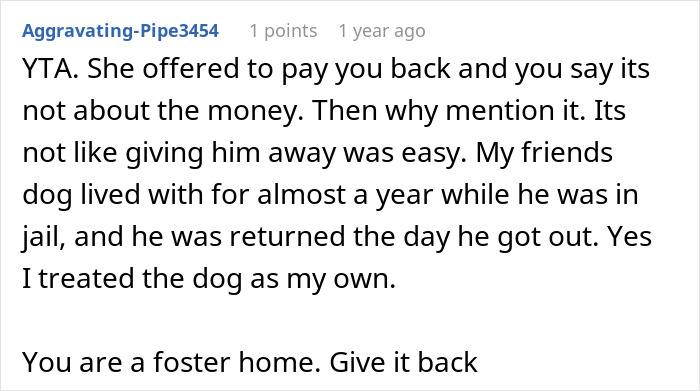

Thanks! Check out the results:You May Like30 Times People Had A Heartbreaking Realization That Their Friends Were FakeViktorija Ošikaitė28 Signs Of A Fake Friend And A Toxic RelationshipLinas SimonaitisWoman Thinks It’s Not Fair To Split The Bill For Meal She Didn’t Eat, Gets A Reality CheckRugile Baltrunaite
Viktorija Ošikaitė
Linas Simonaitis
Rugile Baltrunaite
Relationships